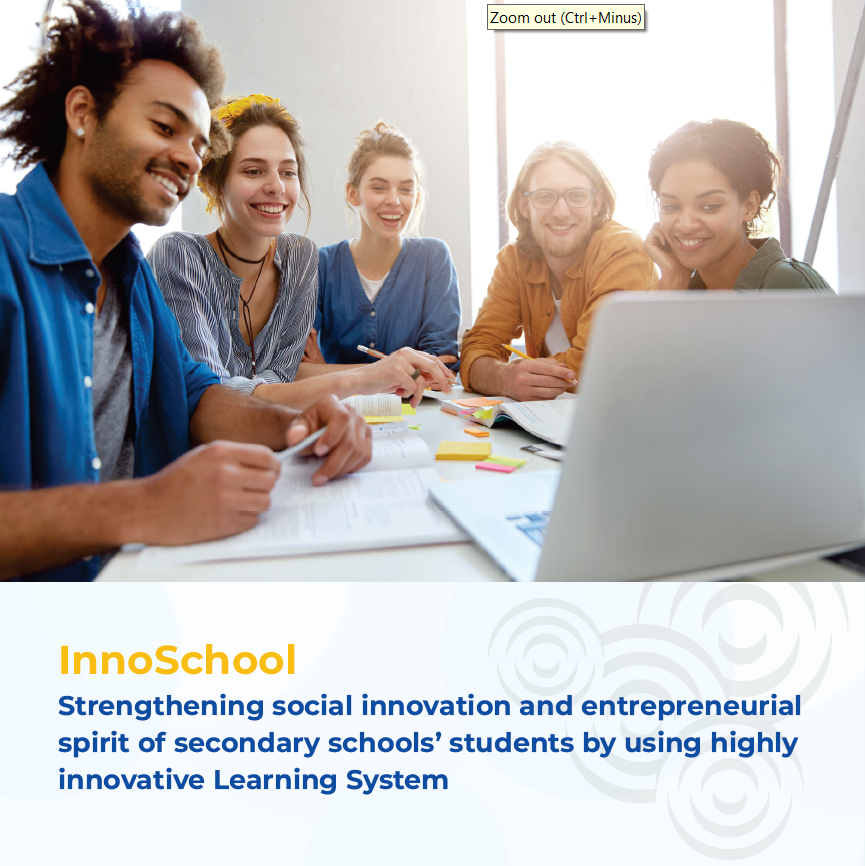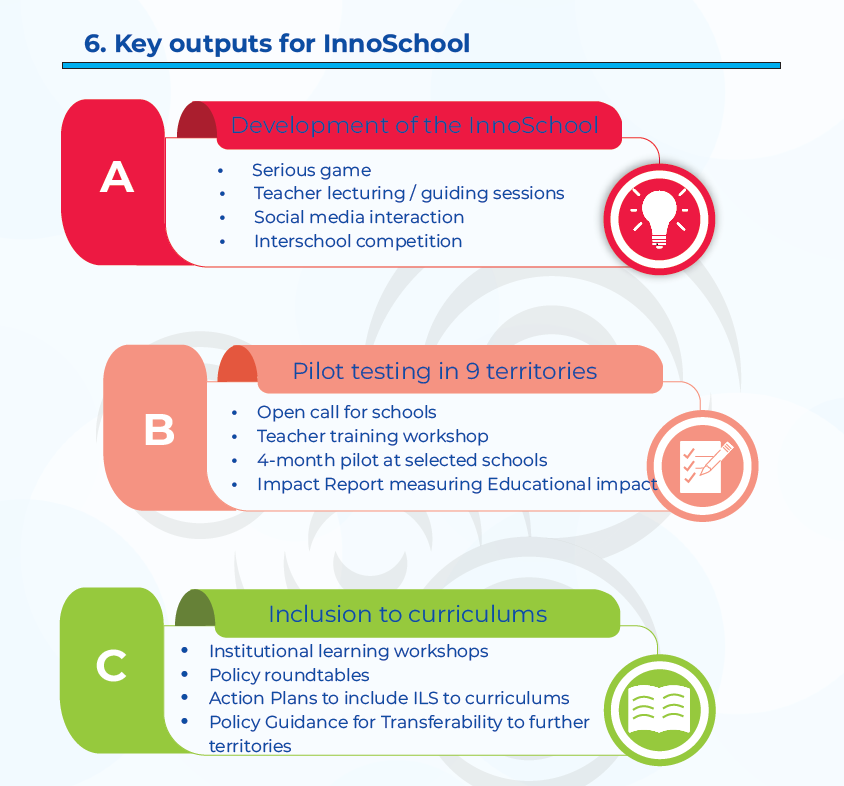InnoSchool - A summary of Educational Framework Mapping
01-04-2019
Developing a highly innovative InnoSchool Learning System, in such a way as to be attractive towards secondary school students, impactful on educational curricula, aimed at strengthening the societal entrepreneurial spirit, must be built on evidence-based research. Considering this, during the beginning of the project (October – December 2018), InnoSchool partners conducted a regional desk research focused on mapping the territorial educational frameworks, under the close coordination of Vienna Board of Education, European Office Project Partner.
Mapping educational frameworks enables the project team to understand key aspects, educational contexts and contents influencing InnoSchool Learning System (ILS) concept definition. More than that, it facilitates gathering significant territorial information for the implementation process of ILS into curricula and schools, information such as: cross-territorial differences in the autonomy of schools and in teachers´ freedom of choice, compatibility with the curricula, availability of resources in schools and students. It aims to incorporate parts of a new learning system in different subjects while fulfilling the goals of the subject´s curriculum. Our preliminary feasibility check allows disclosure of important aspects for the selection of pilot schools, involvement of stakeholders, limitations and adaptations needed for a better integration of ILS into schools.
9 European countries (Czech Republic, Bulgaria, Romania, Hungary, Austria, Slovakia, Bosnia and Herzegovina, Serbia and Moldova) were investigated in regards to the current integration of entrepreneurship in curricula of upper secondary schools. Next to desk research, the methodology applied for the mapping exercise included a questionnaire for conducting interviews and focus-groups with relevant stakeholders: teachers, school directors, representatives of entrepreneurs and local administration, organizations working with territorial social needs.
In most territories, entrepreneurship education has still little presence in the curricula of upper secondary schools or is practiced in a very basic form. Below we provide an overview of the current situation of entrepreneurship in education systems across the involved countries.
Entrepreneurial education in Czech Republic is part of the curricula, but not to the extent to which the topic is taught. It depends on the school director and incorporation of the topic into a particular field of study. At the grammar schools, entrepreneurial competences are divided in the socio-scientific basis. Secondary vocational schools have a wider version and more space in terms of business activities. Economic secondary schools have a direct subject of applied economics, which deals directly with business. Entrepreneurship also appears in the content of education itself, but it is generally marginal and focuses rather on the position of an employee. At this rate, by the end of 2019 we can expect a grand review of curricula with great positive effects on entrepreneurship skills in the Czech Republic. The effort is to implement the business in a large part of the subjects taught. Subsequent revisions will provide methodologies to help schools with the application of the revised curriculum. So, we can conclude, that ILS proposal is in line with the new curricula and becomes a real opportunity for actively supporting education.
Austria’s strategy is referring to the recommendation of the European Parliament and Council on Key Competences for Lifelong Learning including a sense of initiative and entrepreneurship as one of eight key competences. The Federal Ministry of Education pursues the goal to implement Entrepreneurship Education at all levels of education and to integrate it into the curricula. However, entrepreneurship is often not explicitly included in the curricula. Following a cross-curricula approach, the skills and learning objectives associated with this key competence are present in the curricula, so there are many points of contact. The Board of Education for Vienna supports the integration of entrepreneurship key competences in its schools. At upper secondary level, entrepreneurship has its strongest presence in the new curriculum (as of 2014) for Secondary Colleges for Business Administration (HAK). Students attend this type of school in the 9th grade at the age of 14+ years. In the cluster "Entrepreneurship - Business and Management" Entrepreneurship education is presented in different subjects as a cross-curricular objective, starting from the 1st semester.
Slovakia is a little different: schools develop curricula at least to the extent set forth by the educational standard of the national education program. The national education program is the main document for creating an individual school educational program that takes into consideration specific local and regional conditions and needs. School educational program can contain courses, the content of which, the institution prepares individually. Teaching business fundamentals at grammar schools and secondary vocational schools occurs in an individual scale and time horizon, depending on the curriculum of the school. The age range of the educated can only be described as the general age range of secondary school students (15-19). The national study program defines the number of hours which should be devoted to the thematic groups. Regarding the concrete form of their education as well as the rest of the hours available for optional courses, decisions can be made at the level of each school and vary depending on the type of schools. Grammar schools usually have 30 free hours per whole period of study program (4 years), vocational schools have the range of 0-30, depending on the type of the school, per whole period of study program (3-5 years).
In Romania, Entrepreneurial Education, as independent subject in national curriculum, is identified as part of the national curriculum. It is taught to 10th grade students (around 16-17 years old), one hour/week, in all typologies of high schools: national college, economic college, technological college, technological high school, standard theoretical high school, pedagogical school and vocational school. A special attention is given to this topic in economic college where certain profiles (services for example) organize the practical stage on exercises firms (3 hours per week).
For high schools in Bulgaria, when the school has chosen a syllabus, without intensive and without advanced language learning, entrepreneurship is part of the curriculum of the subject "Technology and Entrepreneurship", which is taught in eight grade (72 hours or 2 hours a week) and in ninth grade (90 hours: 2 hours during the first school term and 3 hours during the second school term). However, currently in the vocational schools’, entrepreneurship is studied in eleventh and twelfth grade, depending on the school specialty.
In Hungary and in the Republic of Moldova, entrepreneurship is part of the curricula and is taught to students between the ages of 14 and 16. In Moldova’s high schools entrepreneurship is part of optional subjects (1 hour/week), but, in the VET System, it varies from 2 to 6 hours per week, depending on the specialty of the school. Meanwhile, in Hungary there are 4-5 hours per educational year (36-37 weeks).
In Bosnia and Herzegovina, all vocational and technical schools have a subject “Basics of entrepreneurship”, available in third or fourth grade, students’ age group 16-18, two times a week. Entrepreneurship is not a part of curriculum in gymnasiums and medical high schools.
Since 2018, Entrepreneurship is a part of Elementary schools’ curricula, as Technics and Technology (with entrepreneurship) in Serbia. It is also part of some Professional/Vocational Secondary Schools. Some courses have obligatory entrepreneurship, while others do not. In Gymnasiums, it is one of the Elective courses, under the name Economy and business. In the schools where entrepreneurship is mandatory, there are 2 classes per week, resulting 62 classes in a school year.
When analyzing the resources available for entrepreneurial education in schools, the most common financial resources identified are salaries. Anyway, these resources are limited and there are no dedicated financial resources for this area. The human resources stated by all the countries are the qualified teachers and in some of them along with external coaches. Even though the school teachers are the main trainers, not all of them have entrepreneurship as a part of their training background. Such examples would be: Romania, Hungary, Czech Republic and Moldova.

Conclusions:
According to the Strategy of Lifelong Learning, new initiatives were started in order to try to implement Entrepreneurship Education as a key competence in schools. In several territories, curricula have already been adapted or are being currently adapted to give Entrepreneurship a greater importance and implement it in different levels of education.
Despite this broadening tendency, Entrepreneurship has its strongest presence in the curricula of certain higher school types - especially vocational and technical education schools and non-compulsory/optional subjects. At Business High Schools, entrepreneurial skills are trained as part of training firms, mini-companies or project work and competitions.
So, there are some similarities between the 9 countries, like the fact that entrepreneurship is a part of education that students receive to some extent. At the same time, a solid and more in-depth approach to entrepreneurship is needed in order to strengthen social innovation and entrepreneurial spirit of future adults.
Key points for the development and implementation of ILS:
- Apart from all the territorial differences, most important for the implementation of ILS into curricula and schools is the evidence-based impact and the practicability;
- Compatibility with the curriculum is reported as an important requirement for a new learning system. ILS contents and learning outcomes must be strongly coordinated with the curricula, not vice versa;
- Developing one overall package suitable for all (regions, types of school, school levels, curricula) will be a challenging task. Despite this heterogeneity, we have to ensure, that every potential school finds something that suits its needs. That is why we have to make ILS flexible and individually fitting!
- For a sustainable implementation of ILS after completing the InnoSchool project, a broadening approach must be sought. The project partnership expresses a strong interest so that ILS would NOT become a minority or elite programme. It aims to benefit as many students as possible.

